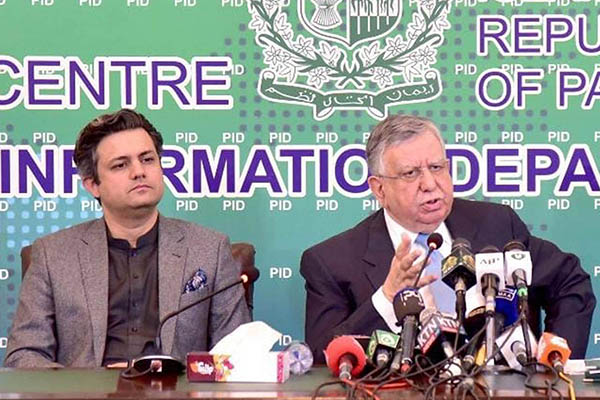
Energy Minister Hammad Azhar and Adviser to the P.M. on Finance Shaukat Tarin address a press conference in Islamabad. Photo courtesy PID
Finance adviser announces Rs. 4/liter increase to petroleum levy per month; withdrawal of GST exemptions as part of ‘prior actions’
The Pakistan Tehreek-e-Insaf (PTI)-led government on Monday announced a series of fiscal measures it plans to implement as ‘prior actions’ to revive an International Monetary Fund (IMF) loan facility that has been suspended since April.
“Negotiations with the IMF have ended successfully,” Adviser to the P.M. on Finance Shaukat Tarin told a press conference in Islamabad alongside Energy Minister Hammad Azhar. He said that the IMF had sought tax reforms to revive the program, adding that this would also allow the Asian Development Bank (ADB) and the World Bank to provide funds to Pakistan.
According to Tarin, the government aims to fully implement five “prior actions” and revive the IMF program by January for the disbursement of around $1.06 billion. Among the actions required is legislation to grant autonomy to the State Bank of Pakistan (SBP) on matters of monetary policy, the exchange rate and recruitments to central bank. He claimed that the proposed law would not make the SBP “independent,” maintaining that it would remain answerable to Parliament.
Emphasizing that he supported independence for the SBP, the adviser said accountability would be left to the courts and institutions such as the National Accountability Bureau and the Federal Investigation Agency. He said the new law would also remove a monetary and fiscal policy board that had included the finance secretary, adding that it would be replaced with a liaison between the finance minister and the SBP governor.
To a question, he said the government would appoint the SBP governor and board of directors, but they would have the authority to appoint deputy governors. The finance ministry would have no role in approving foreign visits of deputy governors and other senior officials, he added.
Tarin said the government would also complete an audit of all COVID-related expenditures—as demanded under the IMF agreement—and make public the beneficial owners of vaccine suppliers and related procurements.
More taxation
A third prior action is removing around Rs. 350 billion in general sales tax exemptions through a supplementary finance bill. The finance adviser said the supplementary bill would increase the revenue target to Rs. 6.1 trillion against the existing Rs. 5.8 trillion, adding that the Federal Board of Revenue had already collected Rs. 225 billion higher than its allocated target in the first four months of the current fiscal year. However, he said, the IMF had been “unimpressed” by the revenue collection and wanted implementation of policy actions to remove distortions like different GST rates for various sectors.
As part of the government’s bid to increase revenue collection, it would be increasing the petroleum levy by approximately Rs. 4/liter every month until it had been raised to the full permissible amount of Rs. 30, said Tarin. This, he said, would allow the government to collect Rs. 356 billion against the budgeted target of Rs. 610 billion, which is no longer achievable.
Energy minister Azhar, meanwhile, warned that basic electricity tariff would also be increased. Suggesting this was necessary due to global inflation, he said the government would still continue the seasonal winter tariff and industrial support tariff of Rs. 12.96 for domestic, commercial and industrial consumers.
Development cuts
A final “prior action” that must be implemented before the loan facility can be revived is a Rs. 200 billion reduction in the Public Sector Development Program, bringing it down to Rs. 700 billion. Around Rs. 50 billion must also be cut from grants.
Regretting that the talks between the government and the IMF had been prolonged, he said this was because his predecessors had committed, in March, to withdraw Rs. 700 billion tax exemptions; increase electricity tariff by Rs. 4.95/unit; and grant autonomy to the SBP against the Constitution. “We have tackled whatever was wrong,” he claimed, adding that he had refused to budge on increasing taxes and energy tariff like a pyramid because that would have made industry uncompetitive and had an adverse impact on the common man.
“The IMF team was in a fix because we had made commitments and got $500 million and it was difficult for them to go back to the IMF board to justify why commitments were made when these were against the Constitution,” he said, adding that he had been able to protect agriculture, tractors, food items, and pesticides from sales tax. “Instead of Rs. 700 billion worth of fiscal adjustment, we were able to save almost half and brought it down to Rs. 350 billion,” he said.
The adviser maintained that economic growth had exceeded the government’s expectations in the first four months of the current fiscal, adding that this was why the SBP and the government were tightening fiscal and monetary policies to ensure the growth did not become unsustainable.
Prior to the press conference, the IMF announced that it had reached a “staff-level agreement on policies and reforms needed to complete the sixth review” with Pakistan on the revival of the $6 billion Extended Fund Facility (EFF). “The agreement is subject to approval by the Executive Board, following the implementation of prior actions, notably on fiscal and institutional reforms,” it said, adding that once the loan revival had been approved by the Executive Board, it would disburse $1.059bn, bringing total disbursements under the EFF to about $3.027bn.
